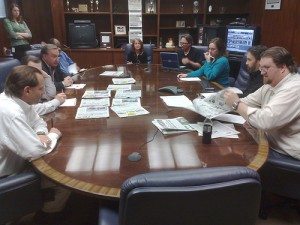 Want to improve your newscasts? Improve your planning meetings. Meeting time may be the only time during the day when a critical mass of news staffers are off the phone and paying attention to the overall content of upcoming newscasts and the Web–not just their own piece of the puzzle. If you can make your meetings better, your newscasts will be better, too. Here are some suggestions from the NewsLab conference, “Reinventing the Desk,” plus a few more.
Want to improve your newscasts? Improve your planning meetings. Meeting time may be the only time during the day when a critical mass of news staffers are off the phone and paying attention to the overall content of upcoming newscasts and the Web–not just their own piece of the puzzle. If you can make your meetings better, your newscasts will be better, too. Here are some suggestions from the NewsLab conference, “Reinventing the Desk,” plus a few more.
- Change the agenda. The way you start the meeting sends a message about what matters in your newsroom. Do you begin with a review of last night’s ratings? A post-mortem of yesterday’s “disaster?” Try starting with what some stations call “the daily win,” and celebrate enterprise to help your newsroom build on success. When you must review what went wrong, think about whether it really was a “disaster” or a case of “we could have done better.” That changes the tone of the discussion from “blame patrol” to “what can we learn from this?”
- De-emphasize the daybook. The events on the daybook will still be there at the end of the meeting. If you start with them, you’ll probably assign the bulk of your limited resources to those “must covers” before you get to any enterprise ideas. Give other stories a chance by discussing them first.
- Set a place for viewers. Your viewers should have a place at the table. Some stations live blog their editorial meetings or invite “public representatives” to attend. Others assign someone to monitor and report on e-mails and phone calls. Consider passing the job around.
- Encourage participation. If the same few people attend your meetings, they’re likely to come up with the same ideas, time after time. Encourage photographers, interns, and people from departments outside the newsroom to come to your planning meetings. If you have a conference bridge as part of your phone system, let people who can’t attend the meeting in person call in and participate via speakerphone. The more perspectives you can bring to the discussion, the more story ideas you’ll have to choose from.
- Talk content, not just logistics. If your story meeting is devoted to logistics, that’s what people will spend their day worrying about. If it’s devoted to content, they’ll focus on that instead. Of course you need to discuss logistics, what stories will go in which newscasts, and which ones are top priorities for the Web, but you can do that in a smaller meeting afterwards among the people directly involved.
- Give everyone a part. Not everybody is great at coming up with story ideas. Find another important job you can delegate like monitoring the competition, reading the papers or scanning the Internet. That makes it possible for everybody to bring something to the table. And it’s one less thing you’ll have to worry about.
- Be more of a coach, and less of a player. The news director or assignment manager isn’t the only person who can run the meeting. Let somebody else do it. Better yet, rotate the responsibility among several people. One station has a rule that no one in management can run the meeting. Ask open-ended questions to encourage others to contribute ideas. And watch the body language that can send an unspoken signal that those contributions won’t really be considered. Nothing shuts down enterprise faster.
- Advocate for others. Support suggestions that have potential, even if they can’t be turned into packages that day. Pitch ideas on behalf of others who simply can’t or won’t attend the meeting.
- Have a holding pen. Create a place for unused but valid story ideas that everybody can see. It may be on a dry erase board in the newsroom or in a computer file or on the sheet of assignments you hand out every day. The goal is to find a way to keep these ideas on everybody’s radar screen so they can eventually find their way into a newscast.
- Recap and review. Do this at the end of every meeting. It’s a good way to ensure that everyone is on the same page, and that the next steps you’ve agreed on will actually be taken. Then share the plan widely. Why not have somebody bring a laptop into the meeting, take notes and mass mail them to your news staff when it’s over?
- Set an example. Get out of the office and bring back some story ideas. See how many you can come up with in a half-hour walk or drive. Tell people how you did it and encourage them to try it themselves. Then support their ideas to encourage more enterprise efforts.








